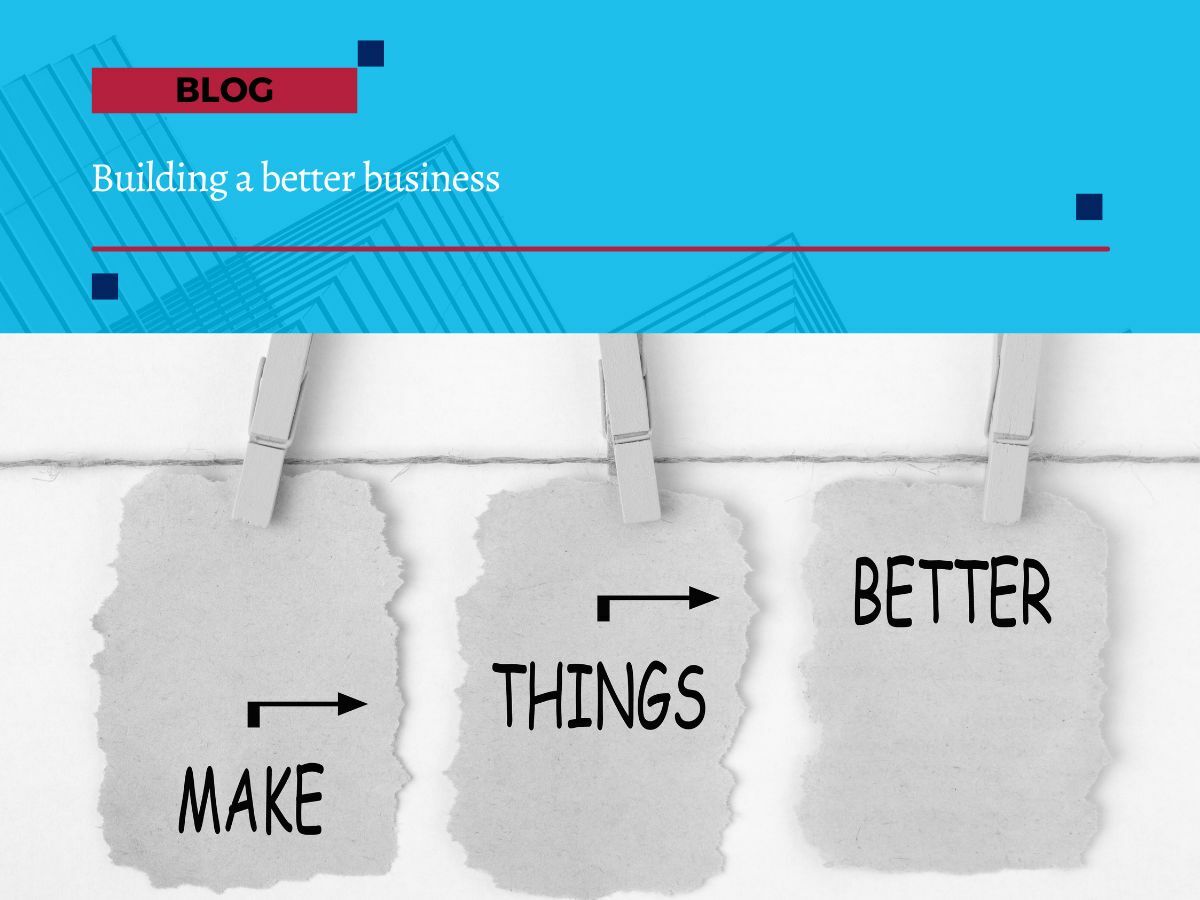Building a Better Business in 10 Steps
What are you doing to build yourself a more successful business? There’s no magic bullet; it’s about taking small steps every day to get a bit better than the day before - it all adds up.
You're in Business
Congratulations! Running a business takes courage and commitment. It’s not easy, and at times you might find yourself questioning why you’re even doing it, but you’re here because you had a vision. You decided that being in business was a better way to achieve that vision than working for someone else. And you’re right; you just have to work on it. Good things come to people who hustle.
Starting a business is an achievement in itself. You’ve taken the leap, faced the uncertainty, and now you’re here. This is a significant step that many people don’t dare to take. It’s essential to remember why you started in the first place. Your business is not just a source of income; it's your legacy and your opportunity to make a difference. The road may be challenging, but it's also rewarding.
Continuous Development
You’re likely an expert in what you do. Maybe you’re a mechanic who knows the inside of a car engine like the back of your hand, or perhaps you’re a fashion retailer who can style anyone. This doesn’t mean you’re an expert at running your business, though. It’s hard taking time out of working in your business to work on it. But doing this is essential for its success.
Continuous learning and development are crucial. The business landscape is constantly changing, and staying updated with the latest trends, technologies, and practices is vital. Attend workshops, read industry publications, and seek out mentors who can guide you. Investing in your growth is an investment in your business's future.
There’s no magical overnight solution to building a more successful business. It’s about taking small steps every day to get a bit better than the day before.
So, What Should You Do to Build Yourself a More Successful Business?
We’ve broken it down into ten essential steps:
1. Get Clear on Exactly What You Want
Understanding your goals is the first step in building a better business. Ask yourself what success looks like for you. Is it about financial freedom, providing excellent service, or making a difference in your community? Write down your goals and make them specific and measurable. Clarity is power.
Getting clear on what you want is essential for setting a direction for your business. Take time to reflect on your short-term and long-term goals. Are you aiming to expand your customer base, increase revenue, or launch new products? Whatever your goals, make sure they align with your values and vision. Break them down into actionable steps, and remember, the clearer your goals, the easier it will be to achieve them.
Key actions:
- Identify your long-term vision and mission.
- Break down your goals into specific, measurable, achievable, relevant, and time-bound (SMART) objectives.
- Regularly review and adjust your goals as needed.
2. Be Open to Change and New Learning
The business world is always evolving, and being adaptable is vital. Embrace change and be open to learning new skills or adopting new technologies. This mindset will keep your business competitive and resilient. Remember, change is not a threat; it's an opportunity.
Being open to change is vital in today’s world. Technology, customer preferences, and market dynamics are constantly evolving. Embrace change by staying informed and willing to experiment with new ideas and strategies. Adaptability is a strength that can set your business apart from the competition.
Key actions:
- Encourage a culture of innovation within your team.
- Stay updated with industry trends and technological advancements.
- Be willing to pivot your business strategy if needed.
3. Define Where You Are Now (Warts and All)
Honesty is crucial. Evaluate your current situation, including your strengths, weaknesses, opportunities, and threats (SWOT analysis). This realistic assessment will help you identify areas for improvement and growth. Understanding where you stand will guide your future steps.
Defining your current position requires a candid assessment of your business. Conduct a SWOT analysis to understand your strengths, weaknesses, opportunities, and threats. Identify areas where you excel and aspects that need improvement. This awareness will help you make informed decisions and allocate resources effectively.
Key actions:
- Conduct a SWOT analysis to assess your current situation.
- Gather feedback from customers and employees to gain different perspectives.
- Identify key performance indicators (KPIs) to measure your progress.
4. Make a Plan
A well-thought-out plan is your roadmap to success. Outline the steps you need to take to achieve your goals, including resources, timelines, and responsibilities. Remember, a plan is not set in stone. Be flexible and willing to adjust it as needed.
Planning is the foundation of any successful business. Develop a detailed business plan that outlines your strategies, objectives, and action steps. Include financial projections, marketing strategies, and operational plans. A clear plan provides direction and helps you stay focused on your goals.
Key actions:
- Create a comprehensive business plan that outlines your strategies and objectives.
- Set realistic timelines and allocate resources accordingly.
- Regularly review and update your plan as circumstances change.
5. Get Your Organisational Structure Right
Your organisational structure impacts how your business operates and grows. Ensure that your team members understand their roles and responsibilities. Streamline processes to improve efficiency and communication. A strong structure supports your business's foundation and scalability.
The organisational structure is the backbone of your business. Ensure that your team understands their roles and responsibilities. Foster a collaborative environment where communication flows freely. Streamline processes to improve efficiency and productivity. A well-organised team is essential for executing your business plan.
Key actions:
- Define roles and responsibilities clearly within your organisation.
- Foster a culture of collaboration and open communication.
- Implement efficient processes to enhance productivity.
6. Be a Better Leader
Leadership is not about authority; it's about inspiration and influence. Lead by example, and empower your team to excel. Communicate your vision clearly and motivate your team to achieve it. Being a better leader positively impacts your business culture and results.
Effective leadership is about inspiring and guiding your team toward success. Lead by example, set high standards, and communicate your vision clearly. Encourage open communication and provide support and guidance to your team members. Being a better leader will inspire your team to reach their full potential.
Key actions:
- Lead by example and demonstrate the behaviours you expect from your team.
- Provide regular feedback and recognition to motivate your employees.
- Invest in leadership training and development for yourself and your team.
7. Be Held Accountable by Someone Independent
Accountability drives results. Partner with a mentor, coach, or accountability group that can provide guidance and hold you accountable for your goals. Having someone outside your business to offer perspective can lead to valuable insights and improvements.
Accountability is a powerful tool for achieving your goals. Consider working with a mentor, coach, or accountability partner who can provide objective feedback and hold you accountable for your progress. Regular check-ins and assessments can help you stay on track and make necessary adjustments.
Key actions:
- Find a mentor or coach who can provide guidance and support.
- Join a business accountability group to share experiences and insights.
- Set regular check-ins to assess your progress and make necessary adjustments.
8. Build Strong Networks
Networking is essential for business growth. Connect with other professionals in your industry, attend events, and join online communities. Building strong relationships can lead to collaborations, referrals, and valuable opportunities that contribute to your business's success.
Networking is an essential part of business growth. Build strong relationships with other business owners, industry professionals, and potential clients. Attend networking events, join industry associations, and engage in online communities. Networking opens doors to new opportunities and collaborations.
Key actions:
- Attend industry events and networking functions to expand your connections.
- Engage in online communities and forums related to your industry.
- Foster mutually beneficial relationships with other business owners.
9. Monitor Your Progress
Regularly review your progress against your goals. Use key performance indicators (KPIs) to measure your success and identify areas for improvement. Tracking your progress allows you to celebrate achievements and make informed decisions for the future.
Monitoring your progress is crucial for staying on track. Set key performance indicators (KPIs) and regularly evaluate your business's performance. Celebrate successes and identify areas for improvement. Monitoring your progress helps you make informed decisions and adjust your strategies as needed.
Key actions:
- Set clear KPIs to measure your business's performance.
- Conduct regular performance reviews and adjust your strategies as needed.
- Celebrate milestones and achievements with your team.
10. Keep Your Well of Happiness Full
Running a business is demanding, but taking care of your well-being is essential. Prioritise self-care and maintain a healthy work-life balance. A happy and fulfilled entrepreneur is more likely to lead a successful business. Remember, your happiness fuels your motivation and creativity.
Maintaining a positive mindset and overall well-being is essential for long-term success. Take time to care for yourself and recharge your energy. A healthy work-life balance is crucial for avoiding burnout and staying motivated. Remember, your business will thrive when you’re at your best.
Key actions:
- Prioritise self-care and well-being to prevent burnout.
- Set boundaries to maintain a healthy work-life balance.
- Engage in activities that bring you joy and relaxation.
Building a Business: The Ongoing Journey
Building a better business is not a one-time event; it's an ongoing journey. Success is not achieved overnight but through consistent effort and dedication. By implementing these ten steps, you can create a solid foundation for your business and set yourself up for long-term success. Remember, small, incremental changes can have a massive effect on your success.
Every step you take, every goal you achieve, brings you closer to the vision you set out to accomplish. Stay focused, stay motivated, and keep pushing forward. The journey may be challenging, but the rewards are well worth the effort.









